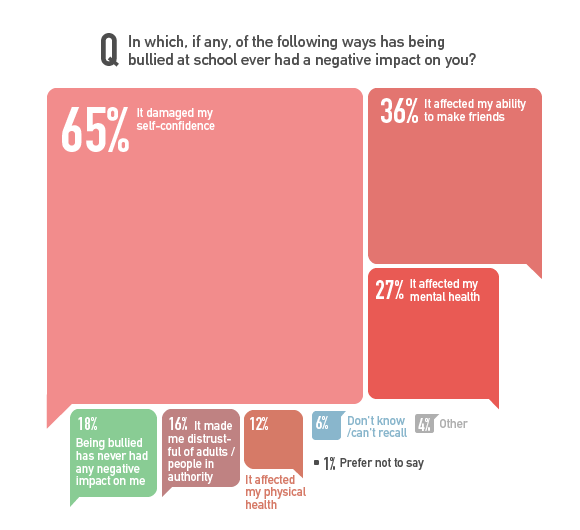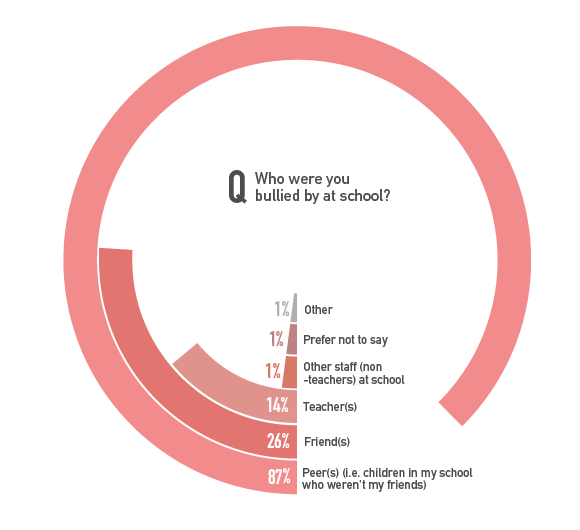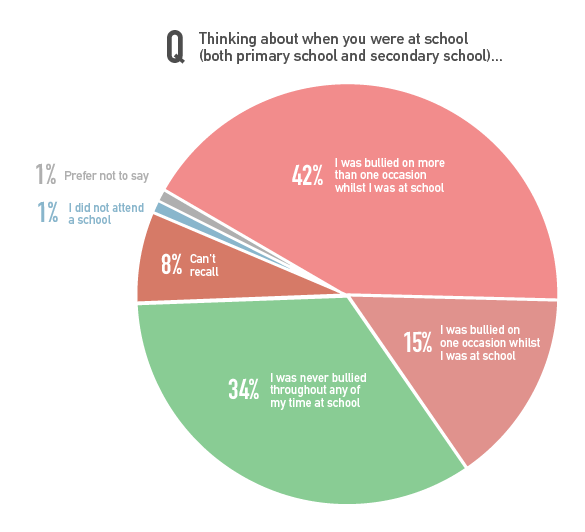Anybody who’s ever experienced bullying knows that it’s not just something that affects you while it’s happening: the damage to your self-confidence and trust in other people can go on well into adulthood too. Oxford Open Learning Trust recently commissioned a survey to get a better idea of the scale of bullying at school and its long-term effects on people, particularly their self-esteem and careers.

The survey asked 2,305 people aged 18 and above about their experiences with bullying and how it has affected their lives. The first result is perhaps the most surprising: more than half of the respondents were bullied at school at least once, and just over two in five were bullied on more than one occasion. Additionally, men were slightly more likely to say they had been bullied than women.
The poll also shed some light on who people are bullied by. While there is a stereotype of the “school bully” who picks on smaller children, the results showed that things aren’t always that simple: friends can be bullies too, as can teachers. People were most likely to say they had been bullied by their peers – nearly nine in ten respondents who had been bullied said it came from children at their school who weren’t their friends. However, over a quarter said they had been bullied by friends at some time or another, and 14% said they had experienced bullying by their teachers.

People who are being bullied are often told to seek support and not suffer it alone, but the survey revealed that this might often be easier said than done. Just over half of respondents said they never turned to somebody else about their bullying while at school, although just under a third said they talked to a family member about it. Others confided in friends or teachers.
Finally, the survey also asked people about the long-term effects bullying has had on their careers, performance at school, and their self-esteem. Nearly two-thirds of people said bullying had had a negative impact on their self-esteem, with women slightly more likely than men to say they had been affected this way. Additionally, just under a third said bullying had harmed their career prospects, and more than a third said it had a detrimental effect on their academic performance.
In all, this survey confirmed that the effects of bullying don’t stop at school. Some of us move on from it more easily than others, and some are fortunate enough to never experience it – but a lot of people continue to feel the impact of bullying well into their higher academic and professional lives.

Greg Smith, head of operations at Oxford Open Learning Trust, said: “For me, the stand-out statistic isn’t that people are bullied at school. Sadly, we all know that, and few of us who work in education will have been surprised that two-thirds of people experience bullying at some point.
“Anecdotally, nearly half of the parents who enrol their children with Oxford Home Schooling list bullying amongst their reasons for doing so. The statistic from our survey which did surprise me was just how many people felt that the bullying had affected their academic performance and future careers. Bullying isn’t something that happens and then you shrug it off, it is something which follows you throughout your life.
“However, the statistic I found most worrying is that more than half of the victims of bullying have never sought any form of counselling or made authorities aware of their problem. This means bullying in school must be massively under-reported. Educators need to make it easier within the school environment for children to report bullying and address it and confront it when it’s reported.
“Fortunately, it is possible to return to education as an adult. Organisations like the Oxford Open Learning Trust are there to help support your return to education. Regrettably, self-confidence is one of the main barriers to learning amongst adults, and bullying in school may have increased this factor. However, if you can overcome this barrier, adult education has been shown to increase your self-confidence, thus getting you back on track.”
